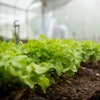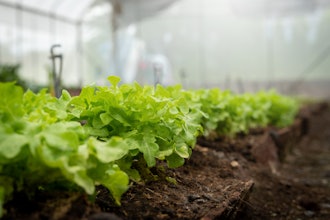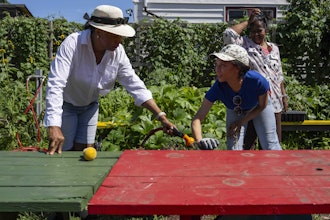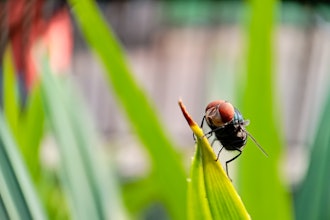
A University of Massachusetts-Amherst food scientist has been awarded two USDA National Institute of Food and Agriculture grants to pursue research designed to benefit the environment and human health in different ways.
In one project, funded with a three-year grant totaling $630,000, assistant professor Jiakai Lu aims to reduce the use of conventional agricultural pesticides by developing an eco-friendly drift reduction agent using essential oils derived from food waste, such as orange peel and culinary herbs.
In the other project, Lu was awarded a two-year, $270,000 seed grant to work on developing a potentially scalable processing technology aimed for plant-based seafood that better mimics the texture of fish meat, a significant challenge in the effort to create a sustainable and environmentally friendly solution to overfishing and related pollution.
The eco-friendly biocidal drift reduction project is a multidisciplinary effort. Lu, who has a background in mechanical engineering, will work with Distinguished Professor of Food Science David Julian McClements, an expert in emulsion formulations; and Baoshan Xing and Jaime Piñero, professors in the Stockbridge School of Agriculture who have expertise in methods to rid plants of pests and microorganisms.
“When you use pesticide sprays, you generate a lot of small droplets that tend to get drifted away by the wind, and that causes a huge problem with pollution and also wasting the pesticides,” Lu said. “Finding a way to reduce the drift is a big deal.”
Adding a small amount of oil to the water-based pesticide formulations in the form of oil-in-water emulsion makes the atomized droplets larger.
“Making those droplets larger when adding oils is related to how oils can easily spread on the interface between air and liquid during the fragmentation process,” Lu said. “And essential oils potentially have better spreading abilities than vegetable oils that are used as an adjuvant.”
The research team will look at the fluid dynamics of the fragmentation mechanisms of spraying with oil-in-water emulsion. And they are hoping for a “synergistic biocidal effect” beyond the reduction of drift.
“So, how can we combine traditional pesticides and essential oils to further reduce the chemicals needed to get rid of pests and microorganisms?” Lu asked.
The next step after the project advances is to educate nonorganic farmers about adopting essential oils for use with pesticides.
“The knowledge gained from this project should provide information that the agrochemical industry can use to develop oil-based drift reduction adjuvants that will improve their performance, utilize more sustainable ingredients, provide additional functionality in boosting the biocidal efficacy and be adaptable to future precision agricultural spray systems,” Lu’s grant summary states.
In the second project, Lu will explore innovative structuring-layering technology for the large-scale production of plant-based fish products. He will collaborate again with McClements at UMass Amherst and with Carlos Corvalan, a food engineer at Purdue University. The unique texture of fish meat – characterized by short muscle fibers and flaky muscle alignment – creates a challenge for realistic plant-based alternatives to seafood.
Lu and colleagues will evaluate the feasibility of revamping a coating technology that uses bio-ink to create a plant-based fish product, layer by layer, through a two-dimensional additive manufacturing process, mimicking the laminated structure of a fish fillet.
“Now the focus is on texture, which relies on utilizing hydrodynamics of the coating process to create short fish muscle fibers from the two-phase bio-ink,” said Sebastian Ubal, a research scientist on the team. “If it works, then we would focus on adding more nutrients and flavors.”
If the project is successful, it “would lead to a new generation of high-quality, affordable, safe, nutritious and accessible fish analogs,” the grant summary states. “Moreover, it would create new economic opportunities by creating the knowledge and technologies to stimulate the development of plant-based food companies.”






















